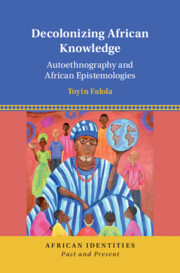
-
Select format
-
- Publisher:
- Cambridge University Press
- Publication date:
- 23 June 2022
- 14 July 2022
- ISBN:
- 9781009049634
- 9781316511237
- 9781009048934
- Dimensions:
- (229 x 152 mm)
- Weight & Pages:
- 0.97kg, 524 Pages
- Dimensions:
- (229 x 152 mm)
- Weight & Pages:
- 0.76kg, 534 Pages
You may already have access via personal or institutional login
Book description
Addressing the consequences of European slavery, colonialism, and neo-colonialism on African history, knowledge and its institutions, this innovative book applies autoethnography to the understanding of African knowledge systems. Considering the 'Self' and Yoruba Being (the individual and the collective) in the context of the African decolonial project, Falola strips away Eurocentric influences and interruptions from African epistemology. Avoiding colonial archival sources, it grounds itself in alternative archives created by memory, spoken words, images and photographs to look at the themes of politics, culture, nation, ethnicity, satire, poetics, magic, myth, metaphor, sculpture, textiles, hair and gender. Vividly illustrated in colour, it uses diverse and novel methods to access an African way of knowing. Exploring the different ways that a society understands and presents itself, this book highlights convergence, enmeshing private and public data to provide a comprehensive understanding of society, public consciousness, and cultural identity.
Awards
Co-winner, 2023 Amaury Talbot Prize for African Anthropology, Royal Anthropological Institute
Reviews
‘In offering a monumental feast for African Studies, Toyin Falola challenges us to look critically beyond disciplinary boundaries by proposing painstaking indigenous paths to scholarly self-determination in the domain of African knowledge production, where the rain of Western epistemologies continues to beat us.’
Rowland Abiodun - Amherst College
‘Even regular readers of the rich and expansive oeuvre of the indefatigable and prolific historian, Toyin Falola, will find a wealth of new insights and fresh analysis weaved around ‘autoethnography’ as an archive, concept and methodology that is ideal for self-understanding of Africa and Africans. With his unwavering commitment to decolonizing knowledge, Falola’s new book is illuminating on aspects of self, nation, culture, art, gender, photography, and everything to do with Africa and Africans.’
Sabelo J. Ndlovu-Gatsheni - University of Bayreuth
‘Toyin Falola’s book, which explores the connection between autoethnography and African studies, opens numerous intellectual possibilities in a characteristically lucid manner. It adds a much-needed scholarly voice and perspective to the burgeoning field of decolonial studies. This offering is most certainly an earnest breath of fresh air by Africa’s most impressive historian.’
Sanya Osha - University of Cape Town
'Falola mines extensive personal archives to provide an alternative to Western-derived hegemonic research methodologies from an individual perspective that incorporates autoethnography and its reflections on the self and the larger shared community … Recommended.'
E. P. Renne Source: Choice
Contents
Metrics
Altmetric attention score
Full text views
Full text views help Loading metrics...
Loading metrics...
* Views captured on Cambridge Core between #date#. This data will be updated every 24 hours.
Usage data cannot currently be displayed.
Accessibility standard: Unknown
Why this information is here
This section outlines the accessibility features of this content - including support for screen readers, full keyboard navigation and high-contrast display options. This may not be relevant for you.
Accessibility Information
Accessibility compliance for the PDF of this book is currently unknown and may be updated in the future.


